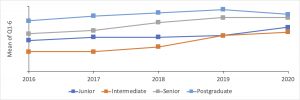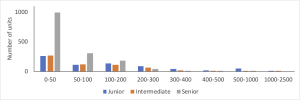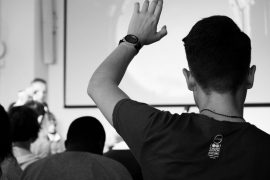For this year’s first year students, classes started on 24th February. Those affected by the travel ban were studying remotely from day 1. The remainder were able to attend face-to-face classes before the first case of COVID-19 on campus on 13th March with all teaching becoming remote by 24th March. The first crucial weeks and months, when building new friendships and social groups would normally have been happening in class and on a lively campus, were spent adapting to learning remotely, living in isolation and worrying about health and wellbeing. Although some may have returned to on-campus classes in semester 2, this year’s first year students have had a very unusual transition to the University. They have reported finding it difficult to make new friends after remote learning began and to maintain engagement with their studies.
At the time of writing, it seems likely that teaching at the start of 2021 will involve a combination of on-campus and remote learning for most students. The second year students will in effect be transitioning to university study and life, whilst at the same time being expected to deepen and broaden their studies, and make decisions which will shape and determine their degrees and future. Compared to second year students in other years, they will have developed different skills and approaches to learning. They will have quite different expectations about the ways in which they will learn. Their experiences in 2020 may have defined their ideas about the nature and purpose of high education. Their friendship groups may be more fragile or unchanged from high school. They may have a weaker sense of belonging and connection to the University. Given the importance of all of these things to success, it is important to consider how to support this group in 2021.
The second year slump
I lived “in college” during my first year at university and, for the most part, attended all lectures, carried along by the discipline instilled through years at school and a certain sense of shared purpose (or least a fear of missing out) with my fellow students. My second year was definitely different. Living in a shared house, that little bit further from the departments, meant that morning lectures were more of a challenge. I also became more interested in new subjects and learnt which ones I was happy enough to get by in. With final exams over a year away, study was secondary.
The “second year slump” (or “sophomore slump”) is a decrease in engagement experienced by some students entering their second year studies. It has been a recognised and studied phenomenon in North American universities1,2,3 for many years, and has also attracted attention in Australia4,5,6. These studies suggest that second year students can feel less engaged with the university experience and learning, with their classes providing less interactivity than those in first year. Second year students report having fewer opportunities to talk to their educators and are less satisfied with the academic guidance and support they receive.
These figures show unit of study surveys results for Junior (1st year), Intermediate (2nd year), Senior (3rd year) and postgraduate units over 2016-20 and the enrolments in 2019. Each year, the second year students report the lowest satisfaction with their units. Second year units tend to have somewhat smaller enrolments than first year units but are still quite large. We are currently focussing on ensuring that new students experience an improved transition to the University, at both undergraduate and postgraduate levels. Given the evidence shown in unit of study survey data (and elsewhere) and the especially unusual and difficult year that they had during their first year in 2020, it seems timely to consider what support this cohort will need as they begin their second year studies in 2021.
Sense of belonging and community
Sense of belonging is strongly associated with both student success and experience, and is a very important focus of orientation and transition activities for new students. Our 2021 second year students’ main interaction with their educators and fellow students will have been online – for some it will have been only online. It will be important to embed opportunities to (re)build connection in their classes. This might involve scaffolded “icebreakers” such as the “My Journey” activity which could be modified to include opportunities for teachers and students to discuss their 2020 journey and which can be used to initiate meaningful synchronous dialogue or asynchronous reflection.
The University community is an incredibly diverse and vibrant one but this is more obvious when teachers and students are on-campus and in face-to-face classes. Whilst ensuring second year students feel that they belong will be an important focus in 2021, they should all develop a sense of being part of the University community. Students can be encouraged to learn about what makes Sydney distinctive as a place through the Kinship Module and Aboriginal Sydney MOOC. They can also be encouraged to engage in on- and off-campus co-curricular life, from mentoring opportunities to clubs and societies, to enrich and own their university experience. They will be looking to their educators, as much as to their peers, to provide information, advice and direction.
Being part of a strong learning community and building upon mutual respect can ensure students remain motivated, engaged and connected. Social learning also helps students succeed and be resilient. Students tell us that they learn best in classes where they are actively engaged with their teachers and with their peers.
Sense of purpose
Developing a sense of direction in their studies is crucial in second year. Course choices will begin to lock in decisions over specialisations and majors, and hence to career or other life goals. Opportunities for students to discuss career and course options with each other and with academic advisors educators and alumni can help provide this.
Values affirmation
The 2021 cohort, though, may be starting their second year with less connection to the University and to their studies and educators than in other years. They may also have developed different ideas about the nature and purpose of higher education. They may well have worries about future job prospects and the world into which they will be graduating. A values affirmation exercise at the start of semester could be used to prompt students to reflect on or re-establish the reasons that they are at university. In the exercise, students identify values that are important to them from a pre-prepared list. They then write about how they could build these values into their lives, and course and career choices. Simple, unmarked tasks of this kind have been shown to have a lasting effect on student success and reliance, particularly for those from under-represented groups and on those with lower self-efficacy.
Re-engagement and the unique role of second year coordinators
As noted above, the second year slump was a well known phenomenon before the COVID-19 pandemic struck. The timing of the academic year in Australia means that our second year students will be starting 2021 in a fairly unique position. Those not affected by the travel ban experienced the briefest flicker of normal campus life before remote learning was forced upon them. Those who were unable to travel may never have set foot on the campus. The experiences of these students in 2020 means that re-connection and re-engagement with their studies is even more important for this group than ever.
Senior students will also face these challenges, but second year coordinators are likely to experience the toughest challenges. Deliberately including activities designed for cohort building and values affirmation right at the start of semester can ensure that these challenges are at least acknowledged. Laying the foundations for a sense of community and purpose then, and building on this with learning tasks in each class, can help re-connect these students to their studies and ensure that they build the sense of purpose that they need to succeed.
In December, January and February, Educational Innovation in partnership with the faculties and University schools will be running workshops for second year coordinators to further explore these ideas and activities. These workshops will also connect coordinators with the student voice and with first year coordinators.
Tell me more
Further reading
- Second Year Experience, University of Minnesota.
- Gahagan, J. and Hunter, M.S., 2008. Engaging sophomores: Attending to the needs of second-year students. College and University, 83(3), p.45.
- Hunter, M.S., Tobolowsky, B.F., Gardner, J.N., Evenbeck, S.E., Pattengale, J.A., Schaller, M. and Schreiner, L.A., 2009. Helping sophomores succeed: Understanding and improving the second year experience. John Wiley & Sons.
- McBurnie, J.E., Campbell, M. and West, J., 2012. Avoiding the second year slump: A transition framework for students progressing through university. International Journal of Innovation in Science and Mathematics Education, 20(2).
- Loughlin, W., Gregory, S.J., Harrison, G. and Lodge, J., 2013. Beyond the first year experience in science: Identifying the need for a supportive learning and teaching environment for second year science students. International Journal of Innovation in Science and Mathematics Education (formerly CAL-laborate International), 21(4).
- Gregory, M.S.J., 2019. Hide-and-seek: Second-year undergraduates lost in the muddy middle. Handbook & Proceedings of Students Transitions Achievement Retention & Success.








2 Comments